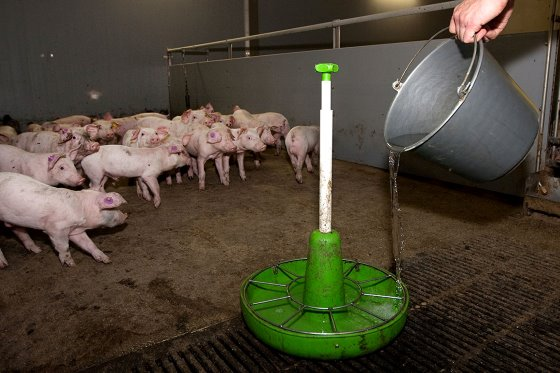来源:Pig Progress
Argentina has banned the ‘elaboration, distribution, import, use and possession of veterinary products containing the active ingredient colistin and its salts’.
阿根廷已经禁止“加工、分销、进口、使用和持有含活性成分粘菌素及其盐类的兽医产品”。
The country does so, following the call of the World Health Organization (WHO) to fight against microbial resistance, and the exhortation by the World Organization for Animal Health (OIE) for the discretionary use of these agents.
在世界卫生组织(世卫组织)呼吁与微生物耐药性作斗争以及世界动物卫生组织(动物卫生组织)劝告酌情使用这些药剂后,阿根廷采取了这一行动。
Heavy human, animal and economic losses
重大人畜经济损失
Resolution 22/2019 was issued by the National Food Safety and Quality Service (Senasa), an independent governmental agency. The resolution explained that the measure is taken because of the heavy ‘human, animal and economic’ losses that antimicrobial resistance causes every year around the world.
独立政府机构国家食品安全和质量服务局(SENASA)发布了第22/2019号决议。决议解释说,之所以采取这项措施,是因为世界各地每年都会因抗生素耐药性而造成严重的“人、动物和经济”损失。

This farm applies colistin in drinking water for the piglets to prevent diarrhoea. Photo: Ronald Hissink
该猪场在仔猪饮用水中添加粘菌素,以防止腹泻
The WHO catalogued colistin and its salts as a ‘reserved medicine’ given its importance ‘as a last resort therapeutic tool in intensive care units’, consequently, it must be preserved for the treatment of human health.
世卫组织将粘菌素及其盐类列为“保留药物”,考虑到其“作为重症监护病房的最后治疗工具” 的重要性,因此,必须将其保存以治疗人类健康问题。
Resistance to colistin in animals was significant
动物体内对粘菌素的耐药性显著
Moreover, the National Program of Vigilance to Antimicrobial Resistance carried out studies in which the levels of resistance to colistin in animals was proven significant. These results showed the urge to avoid the administration of the agent and its salts to the animals intended for human consumption and therefore to preserve its effectiveness in the treatment of infections caused by multi resistant bacteria in humans.
此外,国家抗菌素耐药性警戒计划进行了研究,证明动物对粘菌素的耐药性水平显著。这些结果表明,人们迫切希望避免向拟供人类食用的动物施用该药剂及其盐类,从而在治疗由人类多重耐药细菌引起的感染方面保持其有效性。
Use of preventive antibiotics banned in 2015
2015年禁止使用预防性抗生素
In a previous resolution, numbered 594/15 and issued in 2015, Senasa had already prohibited that animal feed would contain preventive antibiotics.
此前,在2015年发布的594/15号决议中,国家食品安全和质量服务局已经禁止在动物饲料中添加预防性抗生素。
Producers are allowed to still include them in the rations they provide, in the case that their goal is “to cure, in a certain period of time, and with a prescription given by the farm’s accredited veterinarian,” according to the Argentinian Association of Pork Producers (AAPP).
据阿根廷猪肉生产商协会(AAPP)称,如果生产商的目标是“在一定时间内通过农场认可的兽医提供的处方进行治疗”,那么他们仍然可以将其纳入他们提供的饲料中。
In the press release, the organisation stated that, “Argentina has started to walk a path that many countries have been walking and it is the responsible use of antibiotics and the active participation of a professional vet in a farm’s sanitary decisions.”
在新闻稿中,该组织表示,“阿根廷已经开始走一条许多国家一直在走的道路,即负责任地使用抗生素,并有专业兽医积极参与猪场的卫生决策。”
(文/爱猪网记者刘坤颖编译,爱猪网原创,转载请注明出处)










